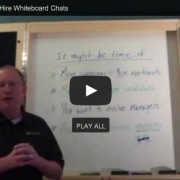The Great Remorse
Since COVID-19 changed the world in 2020 emotions have been elevated. Human Resources professionals continue to ride an emotional roller coaster as they diligently try to fill job openings, minimize attrition and reduce spending in an ultra-competitive job market with more openings than talent can readily fill. However, HR professionals are not the only individuals full of uncertainty at this time.
COVID-19 was the catalyst for job seekers to maximize their job satisfaction. In all career fields, no matter if hourly or salary, an increasing number of employees decided to redefine their lives by choosing to leave their current role in hopes of attaining a role that would offer a better work-life balance to acquire a sense of mental renewal and improve logistics. Some individuals who hit their threshold gambled and exited without acquiring a new job. This mass exodus of employees leaving their employing organizations in hopes of greener pastures was coined “The Great Resignation”.
“The Great Resignation”
According to findings from the Bureau of Labor Statistics, 47 million Americans quit their jobs in 2022 compared to only 42 million workers who quit in 2019. A multitude of reasons exist as to why Americans were quitting their jobs, but the main reasons include low pay, lack of advancement, work disrespect, child care challenges, and lack of flexibility. During the pandemic many fields were thrust into remote work. As employees became acclimated to the flexibility and benefits of remote work, their preference, and even need, for it increased.
When companies sought to bring employees back onsite, numerous employees rebelled at that request and started searching for something different. Many employees believed that something better existed somewhere, so they submitted their resignation and took a giant leap into the unknown. For many individuals, that leap into uncertainty proved successful, as they landed a new role that fulfilled missing needs. Not all pastures turned out to be greener though.
For others, the uncertainty transitioned into remorse as they did not find something better than what they had. What they found was often worse than what they anticipated leading into the expanding ideology called the “The Great Remorse”.
“The Great Remorse”
Research is showing that many job seekers are starting to question their decision to quit their previous role. According to a Harris poll, two-thirds of job seekers feel they should have started looking for a new job sooner. Another 67% feel that it would have been easier to find a job in 2021 as compared to this year. What is startling is this statistic: approximately 72% of job seekers say that companies are ignoring applications. This is by either not scheduling interviews, or ghosting applicants. While time is of the essence in the Human Resources world, taking time to acknowledge submitted applications and informing applicants that they were not selected for the role in which they applied is an essential professional behavior.
HR Communication
Communication with all applicants shows professionalism reflective of the Human Resources department and organization as a whole. Even more, it is ultimately a kind gesture to communicate the status in the hiring process to an applicant. No applicant wants to be rejected, but at least the applicant will receive some closure. Instead they are left wondering if or when they might be acknowledged. The applicant that is rejected for one position might be the best talent for another open position. This makes it imperative that an organization leave the applicant with a positive view of the hiring process for potential future positions.
Ghosting is the concept of communicating with individuals and then no longer responding. This is not a concept that HR wants to be perceived as doing with applicants. Work loads are undoubtedly heavy for Human Resources personnel. However, active communication engaging applicants in the hiring process keeps applicants more satisfied. It allows them to know more of what the expectations and next steps are in the hiring process. ExactHire HR Software can streamline communication with applicants offering the convenience of emailing or texting communication with applicants. Communication is quick and easy. Create unique messages or customize existing communication templates to allow software users to craft messages that can be personalized towards one or more applicants.
Impacts of The Great Remorse
In March 2022, a Harris poll showed that over one-third of those who quit during the previous year were regretting that decision as work-life balance either did not improve, or it worsened. Their new job was not what they thought it would be, or they actually missed their previous organization’s culture. Another study indicated that nearly 20% percent of resigned employees returned to their previous company. Employees who leave their employer, work at a different employer, and then return to their previous employer are called “boomerang workers”.
LinkedIn data reveals that the number of boomerang employees increased from 2% of all new hires in 2010 to 4.3% in 2022. Not all employees are employees that an organization might want back on the payroll; however, if employees leave on good terms and have proven themselves as successful contributors to the organization, it is beneficial for the organization to consider rehiring them. Boomerang employees offer many benefits to an organization. They are familiar with the organizational culture and job responsibilities so less time is spent on onboarding them.
They also have a higher time to productivity ratio. The company saves a tremendous amount of money as they do not have to invest time and financial resources. They don’t have to post a vacancy, screen applicants, conduct interviews and offering the role to an applicant. The applicant might then decline the role, but if they accept then you need to onboard a new hire.
Looking at the Future
Human Resources professionals will not forget 2022 anytime soon. As 2023 rapidly approaches, HR professionals and management can make resolutions to welcome boomerang talent. If previous employees reach out with regret for leaving, listen to what they say and what their needs are. Listen, not hear but listen, to their words, and evaluate the current situation, reasons for their departure and what they can provide to the company.
Employees are human, and the last three years have taken an emotional toll on everyone. The grass is not always greener on the other side, but taking time to care for oneself can lead to having a greener pasture. For some individuals, it takes time to realize that. If a former employee wants to come back to an employer, the employer can benefit from keeping the door open to boomerang employees. This allows all entities to thrive in a renewed environment supportive of each others’ needs.
Photo by Startupstockphotos on Pixabay








